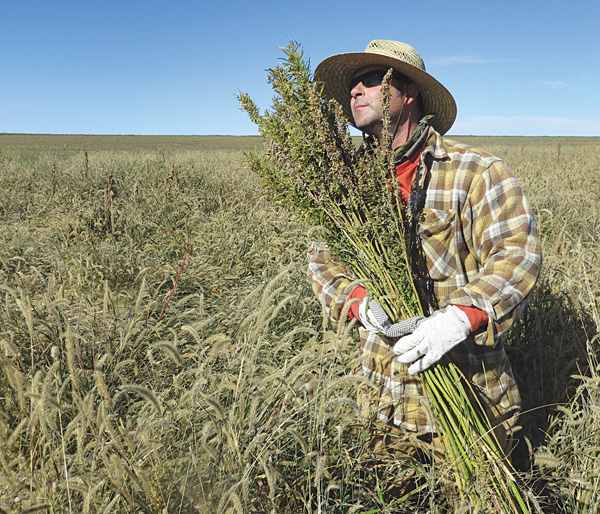Government to allow farmers to grow hemp


Hemp chef Derek Cross helps harvest hemp during the first known harvest of the plant in more than 60 years in Springfield, Colo. The federal farm-bill agreement reached Monday reverses decades of prohibition for hemp cultivation. Instead of requiring approval from federal drug authorities to cultivate the plant, the 10 states that have authorized hemp would be allowed to grow it in pilot projects or at colleges and universities for research.
Associated Press
DENVER
The federal government is ready to let farmers grow cannabis — at least the kind that can’t get people high.
Hemp — marijuana’s non-intoxicating cousin that’s used to make everything from clothing to cooking oil — soon could be cultivated in 10 states under a federal farm bill agreement reached late Monday.
Some wonder if the move is an indication that the federal government is ready to follow the 20 states that already have legalized medical marijuana, including two that also allow its recreational use.
“This is part of an overall look at cannabis policy, no doubt,” said Eric Steenstra, president of Vote Hemp, a Washington-based advocacy group.
However, opponents of legalized pot insist the hemp change doesn’t mean marijuana is right behind.
Kevin Sabet, director of Smart Approaches to Marijuana, a national alliance that opposes legalization and imprisoning people for marijuana possession, downplayed the change to the farm bill.
“On the one hand, I think it’s part of a larger agenda to normalize marijuana, by a few,” Sabet said. “On the other hand, will it have any difference at the end of the day? I would be highly skeptical of that.”
Hemp and marijuana are the same species, Cannabis sativa. Hemp, however, is cultivated to reduce or eliminate THC, marijuana’s psychoactive chemical.
With the move allowing the cultivation of hemp, the U.S. government hopes to clear the way for farmers to compete in an industry currently dominated by China and Canada.
Even though it’s not grown here, the U.S. is one of the fastest-growing hemp markets. In 2011, the U.S. imported $11.5 million worth of hemp products, up from $1.4 million in 2000. Most of that growth was seen in hemp seed and hemp oil, which finds its way into granola bars and other products.
Hemp historically has been used for rope but has hundreds of other uses: clothing and mulch from the fiber, foods such as hemp milk and cooking oil from the seeds and creams, soap and lotions.
The 1970 Controlled Substances Act required farmers to get a permit from the Drug Enforcement Administration to grow hemp, though finished hemp products remained legal in the country. The last DEA hemp permit was issued in 1999 for a quarter-acre experimental plot in Hawaii. That permit expired in 2003.
The U.S. Department of Agriculture last recorded an industrial hemp crop in the late 1950s, down from a 1943 peak of more than 150 million pounds on 146,200 harvested acres.
Cultivation of the plant had congressional allies from both ends of the political spectrum. Democrats from marijuana-friendly states have pushed to legalize hemp cultivation, as have Republicans from states where the fibrous plant could be a profitable new crop.
“We are laying the groundwork for a new commodity market for Kentucky farmers,” Sen. Mitch McConnell, R-Kentucky, said in a statement. McConnell was a lead negotiator on the inclusion of hemp in the farm bill.
The full House and Senate still must agree on the bill that will head to the House floor today.
 43
43
